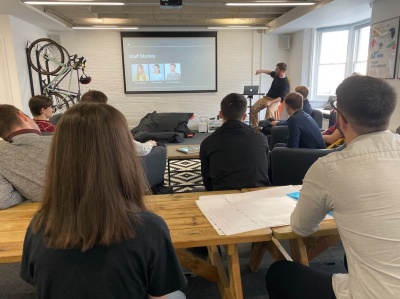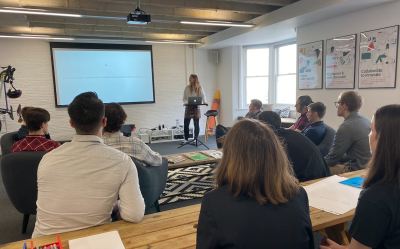
Landing Your First Job as a Junior Designer

- Future Talent
I’ve been at Graphite for almost three months now and can’t quite believe my luck. It’s clear that the design industry is crowded and more young people are applying to jobs; therefore making the challenge of succeeding much greater. Unfortunately, some jobs will have hundreds of people applying and only one person can ever take the position, so you have to try your absolute best to secure it. Knowing exactly what to do when applying and when you’re being interviewed isn’t as straight forward as it seems.
How to get your first digital design role
I’ve been at Graphite for almost three months now and can’t quite believe my luck. It’s clear that the design industry is crowded and more young people are applying to jobs; therefore making the challenge of succeeding much greater. Unfortunately, some jobs will have hundreds of people applying and only one person can ever take the position, so you have to try your absolute best to secure it. Knowing exactly what to do when applying and when you’re being interviewed isn’t as straight forward as it seems.
With that slightly un-easy thought in mind, even getting to the interview stage in the application process can be difficult. I spoke to Rob Verheul, the Studio Director at Graphite, who interviewed me along with two of the Senior Designers. I gave him some questions which I felt would certainly give myself more insight as to why they picked me, but mainly give others a greater understanding of what might increase their chances of getting their first job as a Junior Designer.
1. What stands out when looking through lots of applications for one junior design position?
We have seen a number of applications where people send through gifts including tea and biscuits, scented paper CV’s, printed brochures and even glitter in the bottom of an envelope. These all make an impact, however, unfortunately, this time and effort doesn’t count for anything unless the portfolio content is strong; only then will someone make it to the interview stage.
2. Are there any big no no’s when interviewing someone?
It’s important not to presume you know too much about the role or the company; assuming something means that you’ll answer questions through a filter – best to go in with questions. At interview stage we’re primarily trying to gauge what that person is like, how well they communicate and whether they are motivated and excited about the opportunity – focus on those things.
3. What would you like to see in a portfolio?
Work that is contemporary and relevant to our own work gets us most excited; it allows us to quickly assess whether the applicant understands the nature of digital design, and how/where they could fit in.
A common issue is that applicants (usually from higher education) put a very broad variety of work into their portfolio; this can cause problems. If the portfolio is full of irrelevant or some lower quality examples then it makes it difficult to judge their abilities for the role we would have for them. Focus on putting only the best, relevant pieces in your portfolio. As few as 5 pieces would be fine.
4. How important do you think it is to have a design education when there are many talented people who are self-taught?
Higher education has a role to play for many people; providing learning tools and connections that are useful later in life. Many people also leave education with a new-found ability to produce and communicate fresh ideas, and an ability to design with a range of different styles and mediums. These skills are all important for the role, however, if you’re one of the talented few that already have these abilities then a design education is not necessary. In some ways, a self-starter whose skills are already commercially relevant would be more attractive.
5. How important is experience/placements before applying?
Probably the most valuable aspect of experience/placements is that you begin to understand the nature of work; how projects are managed, how to communicate appropriately, and what constitutes good work. With this in mind perhaps the best work experience could be working freelance for private clients or organisations, as they will have had to learn these skills first hand in dealing with clients.
6. How much of your decision is based on what the applicant is like as a person?
Firstly the individual’s level of skill will be assessed, and then if it is appropriate or the individual demonstrates a very strong understanding of the fundamentals of typography and layout (the rest can often be taught), then personality becomes the next defining factor. At Graphite we only hire nice people who are driven to further their skill set and able to communicate their ideas – I imagine we’re not the only ones!
Design is something I feel extremely passionate about and it’s exciting to see other young people like myself starting their careers, creating fresh and inspiring work. Everything that Rob said above is absolutely true and I would give anyone else the same advice.
I do feel like there is a final thing to say though; I’ve always felt that being honest about your work and yourself is very important. It’s better to be someone with incredible potential and the willingness to challenge themselves to learn more, rather than someone who believes they already know everything they need to know. It’s also best to be yourself and find a place that suits you personally. There will be many different environments and types of people you’ll be faced with and not all of them will suit you. It’s better to be someone’s shot of whiskey than everyone’s cup of tea.
If you manage to do those two simple things as well as the things Rob spoke about above, I’m sure you’ll find the job you want and more importantly; a job you’ll love.
Want more on future talent?


Digital Career Journeys - Advice For Students Part 1
